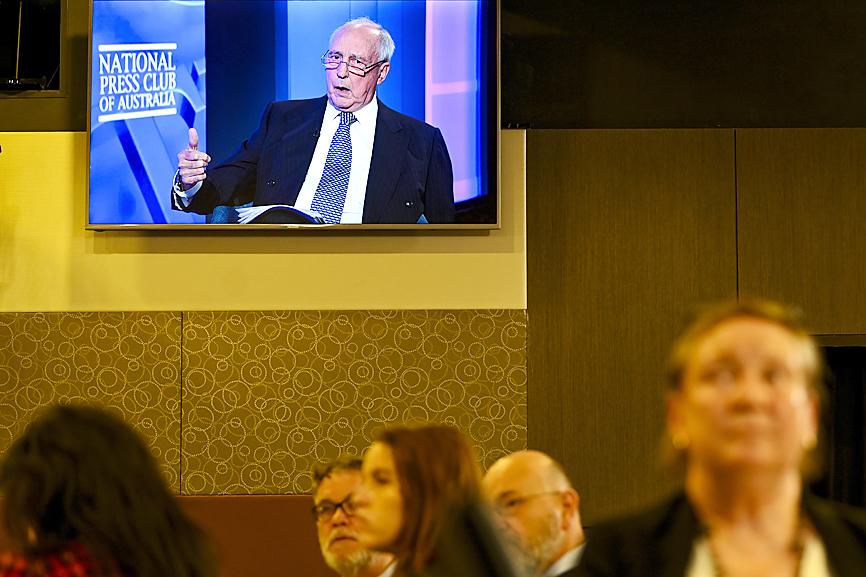Taipei has hit back at former Australian prime minister Paul Keating after he said that Taiwan was “not a vital Australian interest,” calling it a “civil matter” for China.
Keating on Wednesday told the National Press Club of Australia that global concerns about China’s aggression toward Taiwan are overblown and criticized bipartisan pushback in his nation.
“Taiwan is not a vital Australian interest,” he said. “We have no alliance with Taipei. There is no piece of paper sitting in Canberra which has an alliance with Taipei.”

Photo: AP
He urged Canberra not to be drawn into a military engagement over Taiwan, “US-sponsored or otherwise,” and said that Taipei was “fundamentally a civil matter” for China.
He also referred to Taiwan as China’s “front doorstep.”
In Taipei, Ministry of Foreign Affairs spokeswoman Joanne Ou (歐江安) said that Taiwan and Australia are important partners, sharing universal values and common strategic interests, while China’s aggression had far-reaching implications.
“The crisis in the Taiwan Strait is by no means a domestic matter between Chinese, and the security of the Taiwan Strait involves the stability and prosperity of the Indo-Pacific region, but also the global peace, stability and development,” Ou said.
The Australian government had demonstrated the importance it attached to the issue in regional dialogues and other multilateral partnerships, she said, adding: “A peaceful and stable Indo-Pacific region is in the interest of Australia, Taiwan and other countries.”
There is international concern about Beijing’s military capability and potential plans for Taiwan.
It has increased its posturing in the Taiwan Strait, including with near-daily sorties of warplanes into Taiwan’s air defense identification zone, peaking with 149 over four days last month.
In his appearance, Keating rejected the labeling of the Chinese flights as “incursions” and said: “The only time the Chinese will attack or be involved in Taiwan is if the Americans and the Taiwanese try and declare a change in the status of Taiwan.”
Keating said that the “general point” of Chinese President Xi Jinping (習近平) and previous leaders was that they would “harmoniously lead the Chinese people into coming to terms with one another.”
However, successive polling shows a growing majority of Taiwanese do not wish to be ruled by China.
Keating also incorrectly said that Australia has “always seen [Taiwan] as a part of China.”
“The whole world has regarded China and Taiwan as one country, the Taiwanese have regarded it as one country, the Chinese, one country,” he said.
Australia’s “one China” policy, like the US’, only acknowledges Beijing’s claim and does not recognize or reject it.
Lowy Institute senior fellow Richard McGregor told the Sydney Morning Herald and the Age that Keating’s narrative about Taiwan had been out of date “for decades.”
“Our military interest is not in fighting a war over Taiwan, but in helping ensure we don’t have to,” McGregor told the newspapers.
Sung Wen-ti (宋文堤), a lecturer on Taiwan-China-US relations at the Australian National University, said that Taiwan was important to Australia “for ideological affinity and for ensuring the credibility of the US’ values-based coalition-building, without which US withdrawal from the Indo-Pacific, and weakened Australia-US relationship, will become more likely.”
“Good people can disagree on whether that makes Taiwan per se a vital strategic interest to Australia, but a strong and dependable US regional engagement certainly is a vital interest for Australia,” Sung said. “And Taiwan is an important part of that puzzle.”

Taiwan is to commence mass production of the Tien Kung (天弓, “Sky Bow”) III, IV and V missiles by the second quarter of this year if the legislature approves the government’s NT$1.25 trillion (US$39.78 billion) special defense budget, an official said yesterday. Commenting on condition of anonymity, a defense official with knowledge of the matter said that the advanced systems are expected to provide crucial capabilities against ballistic and cruise missiles for the proposed “T-Dome,” an advanced, multi-layered air defense network. The Tien Kung III is an air defense missile with a maximum interception altitude of 35km. The Tien Kung IV and V

The disruption of 941 flights in and out of Taiwan due to China’s large-scale military exercises was no accident, but rather the result of a “quasi-blockade” used to simulate creating the air and sea routes needed for an amphibious landing, a military expert said. The disruptions occurred on Tuesday and lasted about 10 hours as China conducted live-fire drills in the Taiwan Strait. The Civil Aviation Administration (CAA) said the exercises affected 857 international flights and 84 domestic flights, affecting more than 100,000 travelers. Su Tzu-yun (蘇紫雲), a research fellow at the government-sponsored Institute for National Defense and Security Research, said the air

A strong continental cold air mass is to bring pollutants to Taiwan from tomorrow, the Ministry of Environment said today, as it issued an “orange” air quality alert for most of the country. All of Taiwan except for Hualien and Taitung counties is to be under an “orange” air quality alert tomorrow, indicating air quality that is unhealthy for sensitive groups. In China, areas from Shandong to Shanghai have been enveloped in haze since Saturday, the ministry said in a news release. Yesterday, hourly concentrations of PM2.5 in these areas ranged from 65 to 160 micrograms per cubic meter (mg/m³), and pollutants were

Taiwan’s armed forces have established response protocols for a wide range of sudden contingencies, including the “Wan Chun Plan” to protect the head of state, the Ministry of Defense (MND) said today. After US President Donald Trump on Saturday launched a series of airstrikes in Venezuela and kidnapped Venezuelan President Nicolas Maduro, concerns have been raised as to whether China would launch a similar “decapitation strike” on Taiwan. The armed forces regularly coordinate with relevant agencies and practice drills to ensure preparedness for a wide range of scenarios, Vice Minister of National Defense Hsu Szu-chien (徐斯儉) told reporters before a